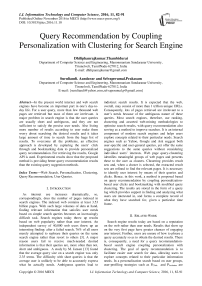Query Recommendation by Coupling Personalization with Clustering for Search Engine
Автор: Dhiliphanrajkumar.Thambidurai, Suruliandi. Aandavar, Selvaperumal.Prakasam
Журнал: International Journal of Information Technology and Computer Science(IJITCS) @ijitcs
Статья в выпуске: 11 Vol. 8, 2016 года.
Бесплатный доступ
In the present world internet and web search engines have become an important part in one's day-to-day life. For a user query, more than few thousand web pages are retrieved but most of them are irrelevant. A major problem in search engine is that the user queries are usually short and ambiguous, and they are not sufficient to satisfy the precise user needs. Also listing more number of results according to user make them worry about searching the desired results and it takes large amount of time to search from the huge list of results. To overcome all the problems, an effective approach is developed by capturing the users' click through and bookmarking data to provide personalized query recommendation. For retrieving the results, Google API is used. Experimental results show that the proposed method is providing better query recommendation results than the existing query suggestion methods.
Web Search, Personalization, Clustering, Query Recommendation, User Queries
Короткий адрес: https://sciup.org/15012592
IDR: 15012592
Список литературы Query Recommendation by Coupling Personalization with Clustering for Search Engine
- Avinash A.P, Prashant M. Narayankar, Muniraj.M.Jeevitha, “Clustering Method: Search Result Based Web Personalization”, International Conference on Advances in Computer and Electrical Engineering (ICACEE'2012) Nov. 17-18, 2012 Manila (Philippines)
- Barathi.M, Valli.S, “Topic Based Query Suggestion Using Hidden Topic Model For Effective Web Search”, Journal of Theoretical and Applied Information Technology 31st January 2014. Vol. 59 No.3ISSN: 1992-8645
- Brin, Sergey, and Lawrence Page. "Reprint of: The anatomy of a large-scale hypertextual web search engine." Computer networks 56, no. 18 (2012): 3825-3833.
- David Hawking, "Web search engines. Part 1." Computer 39.6 (2006): 86-88.
- Eldar Sadikov, et al. "Clustering query refinements by user intent."Proceedings of the 19th international conference on World Wide Web. ACM, 2010.
- Gloria Chatzopoulou, , Magdalini Eirinaki, and Neoklis Polyzotis. "Query recommendations for interactive database exploration." Scientific and Statistical Database Management. Springer Berlin Heidelberg, 2009.
- Hina Agrawal, and Sunita Yadav. "Search Engine Results Improvement--A Review." Computational Intelligence & Communication Technology (CICT), 2015 IEEE International Conference on. IEEE, 2015.
- Joachims.T, “Optimizing Search Engines Using Click through Data,” Proc. ACM SIGKDD, 2002.
- Kenneth Wai-Ting Leung, Wilfred Ng, and Dik Lun Lee. "Personalized concept-based clustering of search engine queries." Knowledge and Data Engineering, IEEE Transactions on 20.11 (2008): 1505-1518.
- Kenneth Wai-Ting Leung. Ng, and D.L. Lee, “Personalized Concept-Based Clustering of Search Engine Queries,” IEEE Trans. Knowledge and Data Eng., vol. 20, no. 11, pp. 1505-1518, Nov. 2008.
- Kenneth Wai-Ting Leung, Dik Lun Lee, and Wang-Chien Lee. "APMSE: A personalized mobile search engine." Knowledge and Data Engineering, IEEE Transactions on 25.4 (2013): 820-834.
- Lamberti, Fabrizio, Andrea Sanna, and Claudio Demartini. "A relation-based page rank algorithm for semantic web search engines." Knowledge and Data Engineering, IEEE Transactions on 21, no. 1 (2009): 123-136.
- Porter, M. F. 1997, “An algorithm for suffix stripping. In Readings in Information Retrieval”, K. S. Jones and P. Willett, Eds. Morgan Kaufmann, 313–316.
- Reiner Kraft, and Jason Zien. "Mining anchor text for query refinement."Proceedings of the 13th international conference on World Wide Web. ACM, 2004.
- Ricardo Baeza-Yates, Carlos Hurtado, and Marcelo Mendoza. "Query recommendation using query logs in search engines." Current Trends in Database Technology-EDBT 2004 Workshops. Springer Berlin Heidelberg, 2005.
- Selvaperumal.P et al, “String Variant Alias Extraction Method using Ensemble Learner”, International Journal of Intelligent Systems and Application (IJISA)(2015).
- Shen Jiang, et al. “Query suggestion by query search:a new approach to user support in web search”, IEEE Transaction (2009): 15-18
- Suruliandi.A, et al.” Validating The Performance Of Personalization Techniques In Search Engine”, Ictact Journal On Soft Computing, April 2015, Volume: 05, Issue: 03.
- Vishwas Raval, and Pranaw Kumar. "SEReleC (Search Engine Result Refinement and Classification)-a Meta search engine based on combinatorial search and search keyword based link classification." Advances in Engineering, Science and Management (ICAESM), 2012 International Conference on. IEEE, 2012.
- Wenhu Tang, et al. "Improved document ranking in ontology-based document search engine using evidential reasoning." IET software 8.1 (2014): 33-41.
- Xiaohui Tao, Yuefeng Li, and Ning Zhong, Senior Member, IEEE,” A Personalized Ontology Model for Web Information Gathering”, IEEE Transactions On Knowledge And Data Engineering, Vol. 23, NO. 4, April 2011
- Xinmei Tian, Qianghuai Jia, and Tao Mei. "Query Difficulty Estimation for Image Search With Query Reconstruction Error." Multimedia, IEEE Transactions on 17.1 (2015): 79-91.
- Zhang, Zhiyong, and Olfa Nasraoui. "Mining search engine query logs for query recommendation." Proceedings of the 15th international conference on World Wide Web. ACM, 2006.
- Zhicheng Dou, Ruihua Song, Ji-Rong Wen and Xiaojie Yuan “Evaluating the Effectiveness of Personalized Web Search” IEEE Trans. Knowledge and Data Eng., vol. 21, no. 8,Aug. 2009


